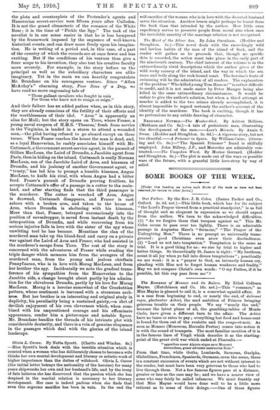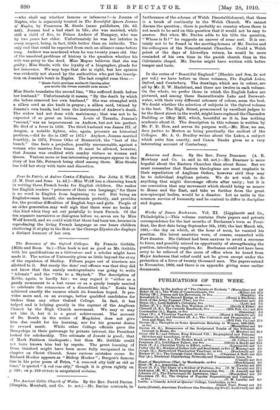The Romance of Monaco and its Rulers. By Ethel Colburn
Mayne. (Hutchinson and Co. 16s. net.)—This "romance," as Miss Mayne is pleased to call it, is a somewhat squalid affair. It is a case from beginning to end, or nearly the end, of delirant reg es, plectuntur Achivi, the mad ambition of Princes bringing grievous trouble on their people. We say " nearly the end," because the latest phase of all, the gambling-tables of Monte Carlo, have given a different turn to the affair. The Achivi have no taxes or rates to pay ; everything but food and house-rent is found for them out of the roulette and the rouge-et-noir. As soon as Monaco (Monoecus, Herculis Portus) comes into notice it is with the sound of trumpets. The most familiar mention of it is in the famous lines of Virgil which describe it as the starting- point of the great civil war which ended at Pharsalia'
" aggeribus sorer Alpinia atque sure Monoeci
descendena, gener adverais burl:morns Eois."
From that time, while Goths, Lombards, Saracens, Guelphs, Ghibellines, Frenchmen, Spaniards, Germans, cross the scene, there is a constant succession of events which are not without interest to the reader, but must have been very grievous to those who had to live through them. Not a few famous figures pass at a distance, greater or less as the case may be ; and we have a nearer view of some who may fairly be called infamous. We must frankly say that Miss Mayne would have done well to be a little more reticent as to some of their doings.—One of these figures
who shall say whether famous or infamous P—is Joanna of Naples, who is separately treated in The Beautiful Queen Joanna of Naples, by Francesca M. Steele (same publishers, 12s. 6d. net). Joanna had a bad start in life ; she was married, while still a child of five, to Prince Andrew of Hungary, who was by two years her elder. Unfortunately he was her inferior in every respect, being, in fact, little better than an imbecile. The only end that could be expected from such an alliance came before long. Andrew was murdered when he was twenty years old. One of the unsolved problems of history is the question whether his wife was privy to the deed. Miss Mayne believes that she was guilty; Miss Steele, with the loyalty of a biographer, pleads for her innocence. We may hope that she is right, but her opinion was evidently not shared by the authorities who put the inscrip- tion on Joanna's tomb in Naples. The last couplet runs thus :- " Quam Carlo genitain multavit Carolim slier
qua morte ills vivum suatnlit ante mum."
Miss Steele translates the second line, " She suffered death before her husband." Unfortunately it means, " By the death by which she before removed her own husband." She was strangled with a silken cord as she knelt in prayer ; a silken cord, twined by Joanna's own bands, had been the instrument of Andrew's death. The widow had not done with matrimony; that was not to be expected of so great an heiress. Louis of Taranto, Joanna's "second," was an improvement on Andrew, but not too perfect. He died of a fever in 1359. The third husband was James III. of Aragon, a notable fighter, who, again, presents an historical problem,—did he die in 1367 or 1375 P Anyhow, Joanna married fourthly, in 1373, Prince Otho of Brunswick, the "best of the bunch." One feels a prejudice, possibly unreasonable, against a woman who marries four times. It must be allowed, however, that Joanna was credited with sundry virtues as woman and Queen. Various more or less interesting personages appear in the story of her life, Petrarch being chief among them. Miss Steele has told her story with taste and discretion.















































 Previous page
Previous page